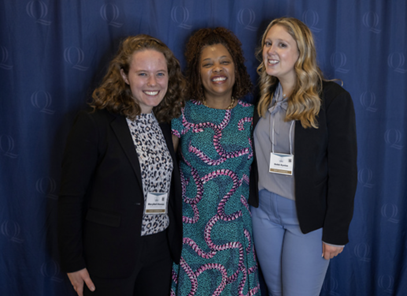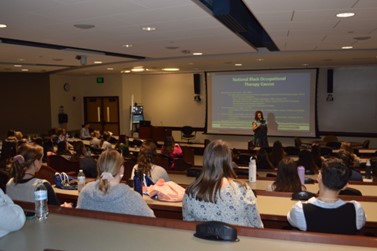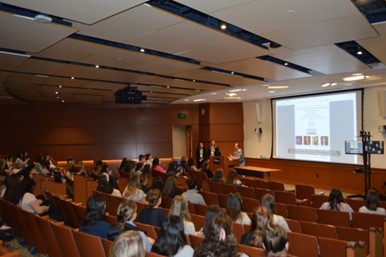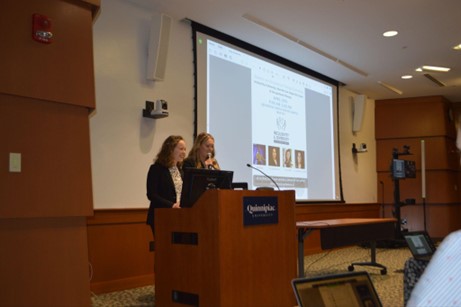Passion project with a purpose: Student-led OT conference
During freshman year as undergraduates at Quinnipiac University, we attended a student-led OT conference planned by graduate students. We were so inspired by the event that 3 years later, we used the same format as a platform for discussions around diversity and inclusivity in occupational therapy. This format is a powerful way to foster conversations about social justice and health care. Through the process of organizing a student-led conference, we learned about the value of student initiative and gained valuable leadership skills. If you are passionate about bringing students together at your university and want to gain unique professional planning skills, here are some tips about how to plan a similar event at your school.
Garner Faculty & Student Support
The first step in the process was recruiting faculty mentors! We reached out to our faculty Chairs around 1 year in advance of our proposed date. Our OT faculty were thrilled and supported us in finding funding for the project through the university. The faculty mentors met with us monthly to ensure that we were connected to the proper university resources in order to advertise the event around campus. They assisted us in recruiting other faculty and students to attend and helped us navigate any challenges that arose. It is also important to find other passionate and dedicated students to form a committee to help plan and promote the event.

From left to right: MaryNell Disman; Dr. Ivy Rentz, Quinnipiac Professor and Conference Speaker; Bobbi Dynice
Create a Theme and Invite Speakers
Having a theme and conference title helped to create a cohesive event. We identified four main topics centered around diversity, equity, inclusion, and accessibility (DEIA) that we wanted presenters to speak on, and began inviting speakers that fit those areas. We researched major organizations related to these topics and filled out speaker request forms on their websites. We also emailed OTs who published research in the related areas and reached out to faculty members asking if they had speaker recommendations based on our theme. Make sure the theme is something that you are passionate about—this will help motivate you to plan an amazing event!

Dr. Ivy Rentz presenting at the conference
Invite, Advertise, & Excite Students, Faculty, and Local Practitioners
We reached out to a variety of local schools with OT and OTA programs to invite them to attend the event. In the future, we hope to establish sustainable partnerships with other schools that could alternate hosting the event. We also connected with our state OT association, which sent emails and posted on social media to invite local practitioners. We were honored to have the current ConnOTA President, Corrin Campbell, give the opening remarks and attend the event! Advertising through flyers, posters, social media, and announcements in classes was integral to increasing student attendance.

ConnOTA President Corrin Campbell giving the conference opening remarks.
Organize Event Details & Logistics
Planning the conference provided us with excellent leadership skills, such as delegating tasks, creating spreadsheets to stay on track, and communicating with various university departments and community sponsors. We stayed organized by keeping all of our resources and to-do lists in a shared Google Drive. We noted who was doing each task and assigned ourselves deadlines for each item. These to-do lists are organized by month and passed down to the leaders for the next year. We also learned the ins and outs of our university and made so many connections across departments. We even teamed up with many local businesses to sponsor our event and help provide food, bags, and other goodies!
Execute and Enjoy the Event
After over a year of planning, the event finally occurred in April 2022. On the day of the event, we coordinated with the members of our committee to help register attendees, set up the food, and network during downtime. We were very proud of the outcome of the event. We had more than 130 attendees and 6 engaging speakers, who generously volunteered their time in person and virtually. For this coming year, we developed an executive board consisting of seven students to share the planning work for the next conference. We have enjoyed mentoring them along the way and hope to see the conference grow each year. We are more than happy to share our planning materials should students at other universities be interested!

MaryNell Disman (L) and Bobbi Dynice giving the opening remarks at the conference
Bobbi Dynice, OTS, is from Marblehead, MA. She is in the entry-level Master of Occupational Therapy program at Quinnipiac University, with a minor in global public health. As a graduate student, she serves as the President of Pi Theta Epsilon, a Student Ambassador for the Office of Undergraduate Admissions, and a Graduate Teaching Assistant for the Occupational Therapy department. She is interested in working in neurorehabilitation and mental health and is currently interning with AOTA’s Mental Health Special Interest Section. She and co-author MaryNell co-founded the Quinnipiac Chapter of the Coalition of Occupational Therapy Advocates for Diversity this year.
MaryNell Disman, OTS, is from Berwyn, PA. She is a graduate student in the entry-level Master of Occupational Therapy program at Quinnipiac University. She is an Assembly of Student Delegates Representative, a member of Pi Theta Epsilon, and co-founder of Quinnipiac’s chapter of COTAD. She is an active member of the Lions Low Vision Clinic on campus and is part of the Global Engagement Fellowship with the Albert Schweitzer Institute. She aspires to deliver compassionate, client-centered care and promote diversity, equity, inclusion, and accessibility (DEIA) practices within the profession.